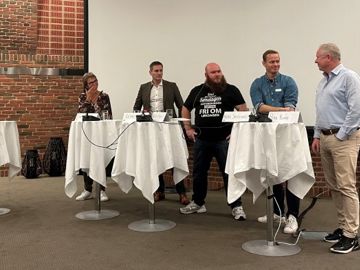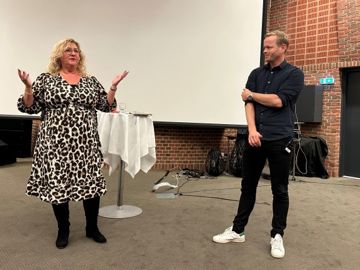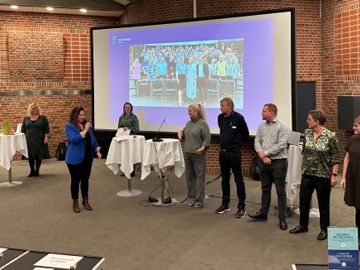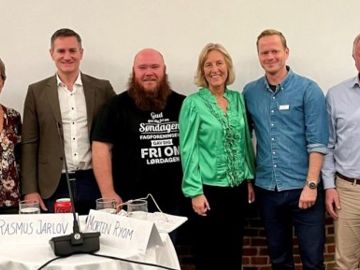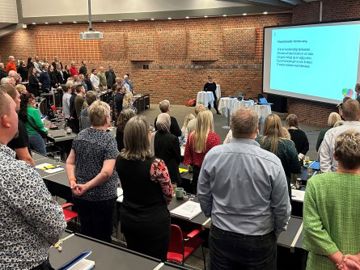Even if you don't like what you hear, it won't go away
Support from the base is alpha and omega. This was emphasized at the seminar for union and working environment representatives. Here, political influence was on the agenda. Finansforbundet in Nordea's new presidency has no problem disagreeing with Nordea's management, but is focused on the fact that results for the benefit of the members require a good relationship
How do you gain influence - and how do you make it visible when you have had success with it? It was one of the dilemmas up for discussion when around 100 union and working environment representatives from Nordea met for a seminar in Roskilde. At the seminar, the political parties and their different approaches to influence were reviewed – exemplified by everything from a happy golden retriever to a stubborn husky (sledge dog).
"We have a task in making it clear to our members when we have succeeded with our negotiations," stressed Dorrit Brandt - former president of Finansforbundet in Nordea and since September elected as president of Finansforbundet (Financial Services Union in Denmark).
The challenge, however, is that most of the victories happen behind closed doors in the negotiation room. It can be a good resignation agreement for a member or an agreement with the bank's management, where the negotiated result is better than expected in the first place.
Not afraid of 'a good conflict'
Several union representatives called for Finansforbundet in Nordea’s board to be more tough towards Nordea's management.
"We invite ourselves to a lot of coffee meetings. They create relationships, and once they are established, it is easier to disagree, because people then know what we bring and who we represent," said Kasper Skovgaard Pedersen, the new president ad interim of Finansforbundet in Nordea. He emphasized that he is not afraid of 'a good conflict':
"That is not my primary goal - not at all. But sometimes the courage to disagree can help solve a problem and a locked situation.”
Vice president Mette Balck Mejlby added by saying that the board has no problems in disagreeing with the bank's management:
"The board certainly does not always agree with Nordea's management. But we are also aware that we must ensure results for the members, and that requires a good relationship. There is a price when we say externally that we disagree with the management. In the long run, we have no interest in damaging Nordea's image, because it could also affect the number of employees. But first and foremost, we represent the members – they are always the ones we are loyal to.”
As a union representative, disagreement is a condition
Peter Klinke, union representative in Nordea Markets, was part of a panel on political influence. He emphasized that trust is the basis of his work.
"As a union representative, disagreement is a condition. The management often have operations as their starting point, where I take care of the person. But often we want to end up at the same place.”
Peter Klinke told how dismissed colleagues can quickly feel forgotten. Often, they are not being contacted by anyone.
He therefore makes a point of contacting former colleagues at regular intervals to find out where they are, what they need and whether there is anything we as a union can help with. It provides invaluable knowledge.
Influence around the coffee machines
Morten Ryom, president of 3F Ungdom (3F Youth), pointed out in the panel debate that the influence occurs around the coffee machines. It is the informal talk that builds relationships, getting people ready for the bigger negotiations.
"The challenge of a compromise is that you are left with a situation where no one is really satisfied," he said, adding that one of the privileges of being young is that you can allow yourself to be more idealistic.
The base to be secured through dialogue
Finansforbundet in Nordea's new presidency appealed to the union and working environment representative to invite them out.
"We really want to come and talk to you and the local members. As we regularly say to Nordea's management: 'Even if you don't like what you hear, it won't go away.' This also applies to us. We want to engage in dialogue with members adding critical input, sending more perspectives into play. It is a must for us to ensure that we have the base included, and that requires dialogue," said Kasper Skovgaard Pedersen, referring to a presentation at the seminar by The Danish Nurses' Organization’s former president Grete Christensen. In the panel debate, she had explained how The Danish Nurses' Organization had lost touch with the base, leading to the members voting no to their collective agreement in 2021.
Not company manager, but president for an association
At the seminar, several union representatives called for a clear direction and strategy from the new presidency. At that time, they had only been in the role for a bit more than a month.
"We have many plans, but we just have to land in our positions first. And I am not a company manager, but a president for an association. Many have talked about Nordea being top-managed. We are the exact opposite. We are elected by the members, so we will include and involve. We will fight for the members' demands and needs - and we hope that we can do it together," was the call from the president ad interim to the union, senior union and working environment representatives.
He sees politics as at least as much process as it is results and numbers on a piece of paper.
"Processes and results are prerequisites for each other. At Nordea, we sometimes become ‘dyscalculic' - especially when it comes to how we talk about our People Pulse. The results are good, but the way we handle and talk about the results may - based on feedback from our union representatives - need a check. We must put more involving processes on the agenda. Other unions have e.g. success with so-called 'listening campaigns'. That exercise will also lead to greater transparency," said Kasper Skovgaard Pedersen.
One size fits none
As a very specific initiative, Finansforbundet in Nordea will put special focus on three communicative themes in the coming year - one at a time. In order to represent the interests of the members as best as possible, the board had reached out to the senior union representatives to get their take on what matters to the members.
The first theme is flexibility, which is much more than the number of days working from home.
"We must find the right balance between space for the individual and a good framework for the community. There are advantages and disadvantages to working from home and from the office, but it is important that there is room for solutions that fit locally. One size fits none! It's about talking together and being open to each other - we are different with different needs," said Mette Balck Mejlby.
In her capacity as vice president of Union in Nordea, she said that the Nordea unions across the Nordics will soon conduct a survey on flexibility:
"We will use the answers in the dialogue with Nordea's management to work towards the best solutions."






